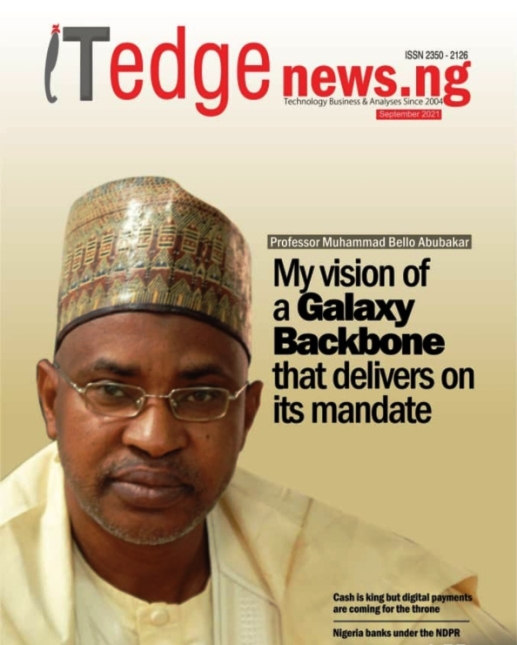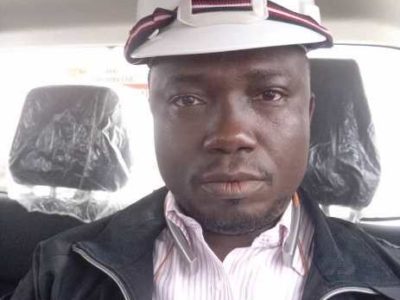Galaxy Backbone Limited, a public enterprise of the Federal Government of Nigeria turned 15 this year. In Abuja, IT Edge News, Olusegun Oruame and Doris Minimah, spoke with Professor Muhammad Bello Abubakar, whose task as Managing Director/Chief Executive Officer is to drive the vision for which the organisation was established in 2006. Amiable and erudite to underscore his scholarly background, Professor Abubakar offers insights into managing a public enterprise, navigating bureaucratic bottlenecks to offer services to a client-base that is largely public sector with all the nuances of ministries, departments and agencies (MDAs) that are digitally challenged. “If you are looking at the ICT infrastructure within the MDAs, their interests are not met because their existing infrastructure whether local wiring … or other devices in use are either outdated or faulty. This means that they cannot best enjoy the services from Galaxy Backbone,” he tells IT Edge News and says government is already working to resolve the end-point dilemmas. Patronage of Galaxy’s services by MDAs has scaled up to about 60% even as he ploughed deeper around the challenges to get MDAs more connected and more enabled with digital infrastructure and services. More fundamentally, the Professor of Petroleum Geosciences, and an oil and gas exploration research consultant, has ventured intensely into building a more robust relationship with private sector partners. “The future direction for the Galaxy Backbone is for the private sector to see us not as competitors but as enablers,” he says inside the company’s Shared Services Centre. His driving motive is to build “an organisation that has actually delivered on its mandate” stitched into the four-way vision to provide robust connectivity infrastructure, foster collaborations, deliver innovative services; and kindle a positive transformation of MDAs and across sectors in line with the national agenda for digital economy.

Galaxy Backbone Limited is 15 years this year and you have the privilege to be leading the organisation. What is the future for Galaxy Backbone from the perspective of the future of network connectivity, cloud, upgradability of technology and shared services?
I truly appreciate you and your team. The good work and efforts you have been putting towards a ‘Digitalised Nigeria’ because the advocacy component is very fundamental and that is part of what we have been championing here; to see that we are able to hold the hands of everybody as stakeholders; to tell them that this is the direction and this is why we are moving in that direction.
We are 15 years and a lot has been put in place since 2006. Whatever we have put in place became clearer especially last year when the COVID-19 struck. That was when everyone starting saying “Ah! do we have all these things? or we do not know that we have this and this and that before now.” But the COVID-19 changed all that. So, I will say Galaxy has done so much in the sense that before now, we were able to put together things and we worked on those things we had put in place to make it possible for the government to continue to discharge its responsibilities despite the lockdown as a result of COVID-19 in 2020.
“The future direction for the Galaxy Backbone is for the private sector to see us not as competitors but as enablers. We are trying to provide the environment that will enable them function well.”
It is fundamentally in 2020, I will say we tried to see that we leverage on the things we have put in place so as to work round the problem that came with the pandemic. I will say we have worked perfectly with the new normal to provide the requisite shared service infrastructure for the government. We have made it possible for the government to continue to operate without being disrupted or encumbered by the attendant challenges of COVID-19.
One of the fallouts of 2020 is the support we give to ensure that every Wednesday, the Federal Executive Council meeting holds virtually. As you know, this is one of the shared components of the technology. Government has been operating seamlessly since May 2020 till the present day so basically as far as shared services are concerned, this what we have been doing; but we have also done much more. Apart from the issue of shared services, we have looked at the policies that are being developed by the government: The National Digital Economy Policy Strategy (NDEPS) 2020 to 2030; we are also looking at the
Nigerian National Broadband Plan 2020 – 2025 in terms of achieving broadband penetration. You know the future is always guaranteed by how much you are able to somehow leverage on the policies that are put in place. So, we look at the policies and then we look at also the structure that we have within the Galaxy Backbone and then we have reviewed the structure, that is the organic structure to ensure Galaxy Backbone is able to align with the policies that were developed.
RELATED
Galaxy Backbone Speeds Up On MDAs’ Patronage By Over 60%
Work Goes On For Nigerian Workers As Galaxy Backbone Deploys Telepresence At 123 Locations
Muhammed Abubakar Takes Charge At Galaxy Backbone As New CEO
Now, we can basically say we are just dancing the tune to what is already set by the government; trying to see that we have done and what the government wants us to do in terms of bringing about improvements in broadband penetration across the country. We are trying to develop human capacity to ensure we are able to leverage emerging opportunities in ICT and digital economy in order to strengthen the overall wellbeing of the economy of the country. Part of the things we have been doing, apart from what we already put in place, apart from the restructuring I have talked about, apart from also motivation we have put into the human resources that we have in Galaxy, we now have another national ICT infrastructure backbone project that was approved recently and on which we have started working.
Initially, our national ICT infrastructure backbone project covered about 13 states from Lagos going through the south western states; some states in the south-east, south-south, then the north central and then to Abuja here, in all, about 13 states all served as startup centres and the metro in Abuja. Now the new project is going to cover about 21 states, so roughly we are going to have about 34 states almost closing on the 36 states meaning that we are almost covering everything. In terms of infrastructure backbone, we are connecting from here to Plateau and Bauchi states then to Gombe state, to Adamawa state, to Yobe, Borno and going back to Kano, Katsina, Sokoto and other places and also going to Niger and to link back to Lagos again to create the redundancy we are looking for. It’s going to link back to Lagos through Niger this time around and get going to some of those states in the south-west creating connectivity across these states.
How does this key into the Storm project you launched not too long ago in the south-south – Is Storm only for the south-south or is it part of the national infrastructure rollout?
It is still part of the future we are looking at in terms of the infrastructure I have talked about and broadly speaking, it is part of the overall plan for wider broadband penetration. Storm reflects our plan to carry everybody along. On the issue of the Storm, we have many kinds of partnerships that we have entered into with the private sector. The future direction for the Galaxy Backbone is for the private sector to see us not as competitors but as enablers. We are trying to provide the environment that will enable them function well. We have the infrastructure that has been laid by the government and then we expect the private sector to come to leverage on this infrastructure. They don’t need to re-invent the wheel.
So, in the context of provisioning of backbone connectivity infrastructure, you would rather not been seen as a competitor but as an enabler by operators such as Backbone Connectivity Network (BCN) in Abuja here?
That is the new direction! Actually, it has been part of the vision of Galaxy Backbone to be a leading enabler of digital inclusion in the country, so we are now trying to practicalize it and that is what informs the Storm you have talked about now. The Storm is actually a project we came up with involving the private sector. The private sector only needs to leverage on the infrastructure that we have and then link up with potential customers at the end-user or terminal point. That way, they are able to enhance the broadband penetration from the government perspective while the private organisation becomes part of value chain in developing the economy, and are also able to improve their revenues, bring added value that improves the total experience of broadband connectivity.
You were talking about remodelling the workforce to be more functional in delivering services. That must refer to the Galaxy 3.0 five -year strategic plan?
Great! I think this is another thing worth mentioning here. We developed a business model sometime last year – a business model covering from 2020 to 2025 and this business model is now championing the vision of the organisation. It has about six fundamental pillars. The first one is on the Government Policies; the second one is on Cyber Security; the third one is Financial Sustainability; the fourth one is Customer Satisfaction; we have the fifth which is supposed to be Operational Excellence; and then finally we have the sixth one which is supposed to be Capacity and Capability Enhancement -that is improved capacity and capability of the work force to specifically be able to deliver on the other pillars. We are already working assiduously to see that we have entrenched everyone in this model.
Galaxy Backbone is government owned you must contend with the bureaucracy that comes with it. You recently asked the legislators to help make laws that will remove some of those encumbrances. You are also battling with getting patronage from government owned ministries, departments and agencies (MDAs). How are you handling these challenges?
I think we are making headway as regards the buying into by the MDAs. They are beginning to know that we are here to make it possible for them to achieve the mandate they have. So, I will say we have been getting a lot of buying from them compared to maybe some years back. You may say it has improved to about 60%. To understand our peculiar challenge with the MDAs, you may look at Galaxy Backbone from this perspective of an electricity transmission company or maybe a water corporation. The mandate we have is similar to what a water corporation or an electricity transmitting company has. They get electricity from the generating company and they will now push it to the DISCOS. Now, if the DISCOS have a problem, maybe transformers, maybe the wiring or other kind of things, you will find out they will not be able to deliver to the customer, which is now the regular houses or the industries or anything you can talk about, despite the fact that the transmission company has brought what they are supposed to bring. It is the same thing with the water board, they will bring water to your door step and if your internal wiring in your house has many holes it may not translate to the services that is desired and ultimately, you have a customer whose interest has not been met. If you are looking at the ICT infrastructure within the MDAs, their interests are not met because their existing infrastructure whether local wiring, even the laptop or other devices in use, among others are either outdated or faulty. This means that they cannot best enjoy the services from Galaxy Backbone.
“We are 15 years and a lot has been put in place since 2006…. It is fundamentally in 2020, I will say we try to see that we leverage the things we have put in place so as to work round the problem that came with the pandemic. I will say we have worked perfectly with the new normal to provide the requisite shared service infrastructure for the government.”
The Galaxy has a mandate to take services to the door step of the MDAs but the mandate of Galaxy Backbone has not covered the local area networking (LAN) of the MDAs so the MDAs can do their own local networking. If the local network has a problem, you will find out that whatever Galaxy has brought to the doorstep of the MDA will not translate to what it is supposed to be and obviously the MDA will be complaining. As I am speaking now, I have to tell you that that the local area network in most of this MDA’s is at least up to 13 to 15 years old. Under normal circumstances, the lifespan for networking should be five years and now you are talking of 13 years to 15 years. This is what the government has seen and they came up with an intervention to Galaxy allowing to upgrade the local network within the MDAs so that whatever Galaxy is bringing now will translate to real service to them. In fact, the implementation committee is on ground to see how they can now move forward. I believe by the time we are able to put this into implementation, the 60% I’m talking about will now jump to 80% or more.
On the issue of the legislators, we have that kind of joint meeting with the legislators, all the senators as well as House of Rep members that are specifically in the committee on ICT and cyber security; we had a kind of sit and get together and we told them some of our own challenges and I want to believe they understood it very well. In fact, they even took it to the floor of the House and it was passed on the floor that government has to do what it takes to see that Galaxy is uplifted to be able to provide the services they are supposed to provide. What I learnt was that it was gazetted and I think they even wrote to the presidency. I will say our relationship with the legislators is good.
How does your vision and management of Galaxy Backbone fit into the national strategy for digital economy being that you are under the supervision of the Ministry of Communication and Digital Economy?
This is a perfect question. You know the direction of the ministry, for now they have developed like 13 policies, but most of these policies are actually coming from the mega policy and that is the National Digital Economy Policy Strategy of 2020 to 2030; and that it also has 8 pillars. Fundamentally, the third pillar is talking about solid infrastructure. Whatever you are doing you have to have this infrastructure upon which you will now somehow leverage on, that is the solid infrastructure and that is exactly what Galaxy is supposed to be doing, laying the infrastructure, providing the infrastructure, enhancing on broadband delivery so that each and every village in the country should at least key into the digital economy policy and that is exactly what we are doing. Another aspect that we are working to develop is digital literacy, this one also, where we formed a completely new department that is based on research, digital innovation and skill development. I think they had about three trainings towards the end of last year, training the chief executives in the MDAs on how to leverage on ICT infrastructure to be able to somehow enhance their own service delivery and achieve their own mandate. The thrust is on e-government enhancement.
They say CEOs come and go. One day, someone else will take over but when you look back someday at when you were managing Galaxy Backbone, what will you think where the most driving things you wanted to achieve that you achieved? Just three things if possible.
One is I want to leave a legacy for the Galaxy Backbone such that it will be an organisation that is standard worldwide. An organisation that can compete with any organisation anywhere as far ICT or digital economy or the mandate as it is in Nigeria is concerned. I want to leave an organisation that is up and doing. An organisation that everybody anywhere in the world can say this is a standard organisation that is delivering on the mandate that it has been given to deliver. This is my fundamental goal. Secondly, I will want to see an organisation that has actually delivered on the mandate itself, my vision for Galaxy should be known not only here Nigeria but in West Africa even in the whole Africa. Thirdly, Galaxy should be looked at as other similar organisations that we have elsewhere in the world whether in South Africa for example, or the G42 in United Arab Emirates as a real government organisation that is driving all other private sector players toward achieving the most broadband penetration we will have in the country.






























